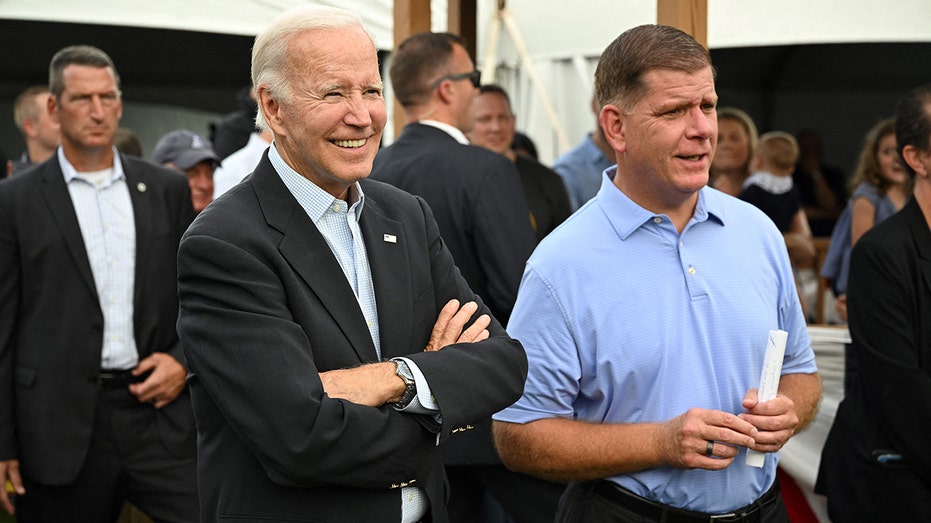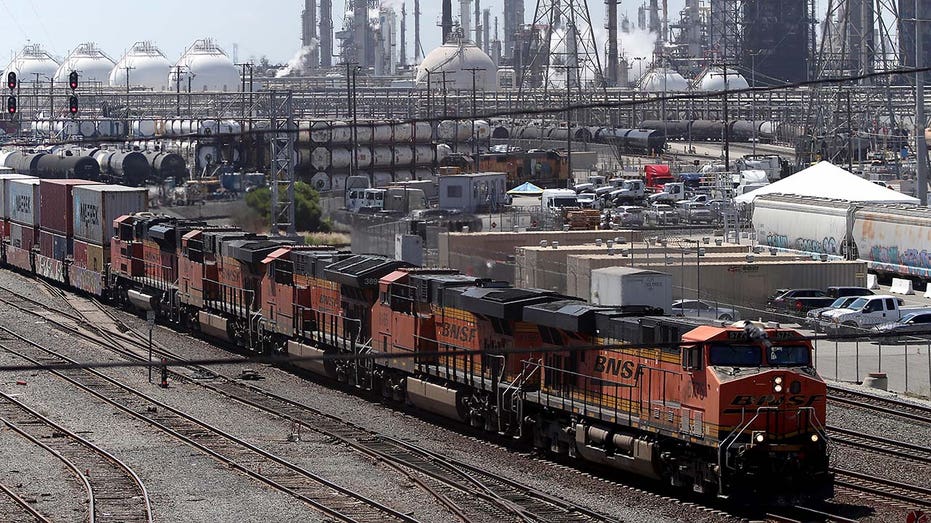Union rail workers rejected latest deal with railroads: What to know
Rail workers say they do not want to strike but must have better working conditions
As rail unions reject Biden's deal, they raise quality of life concerns
BMWED's Peter Kennedy and president Tony Cardwell say issues remain regarding sick leave for railroad workers.
Union rail workers unhappy with the new contract proposals from major freight railroads brokered by the Biden administration say their voices are not being heard, arguing that the deal struck in September granted unfair leverage to their employers in a dispute that could very well result in a nationwide strike.
Workers represented by the Brotherhood of Maintenance of Way Employees Division of the International Brotherhood of Teamsters (BMWED), the third largest of the 12 unions part of the negotiations, became the first labor organization to reject the new contract earlier this month.

A BNSF Railway terminal worker monitors the departure of a freight train on June 15, 2021, in Galesburg, Illinois. (AP Photo/Shafkat Anowar, File / AP Newsroom)
| Ticker | Security | Last | Change | Change % |
|---|---|---|---|---|
| UNP | UNION PACIFIC CORP. | 252.62 | +1.14 | +0.45% |
| CSX | CSX CORP. | 40.61 | +0.74 | +1.86% |
| NSC | NORFOLK SOUTHERN CORP. | 306.51 | -0.44 | -0.14% |
BMWED union representatives then presented the National Carriers' Conference Committee (NCCC), which represents major railroads like BNSF, CSX, Norfolk Southern and Union Pacific, with additional demands from the workers.
But the NCCC turned those down and noted that BMWED union leadership "hailed the tentative agreement" the workers rejected, saying in response that "now is not the time to introduce new demands that rekindle the prospect of a railroad strike" after President Biden's Presidential Emergency Board (PEB) "carefully considered and rejected" those "additional benefits."
TRUCKING JOBS EVAPORATE AS SHORTAGE WORSENS
One BMWED member, who has worked at CSX for several years and spoke with FOX Business on the condition of anonymity, said the demands are not new and that the union should not have agreed to the tentative agreement in the first place.
"What hurt us is our union officials accepted it," the worker said.

President Joe Biden and Labor Secretary Marty Walsh attend a Labor Day visit to United Steelworkers of America Local Union 2227 in West Mifflin, Pennsylvania, on Sept. 5, 2022. (Mandel Ngan/AFP via Getty Images / Getty Images)
It is true that the new contract would mean the biggest pay hike for rail workers in 50 years, amounting to a 24% collective raise over the course of the five-year contract retroactive to 2020, and $5,000 in bonuses.
The BMWED member noted, however, that when looking at the raises on an annual basis, they do not keep up with inflation.
Some union members FOX Business who spoke with were fine with the pay increases in the contract but cast doubt on the NCCC's claims on what rail workers actually make. The railroads' negotiators claim the workers impacted by the new contracts made an average of $122,000 per year as of 2018. According to the Bureau of Labor Statistics, the median pay for a railroad worker was $64,150 as of 2021.
Regardless, the workers agreed on one major thing they are fighting for: a better way to take sick time off.
MORE US COMPANIES CHARGING EMPLOYEES FOR JOB TRAINING IF THEY QUIT
"The NCCC stated we have sick benefits, that is true. But to start claiming the benefits, you need to be off 7 days – 7 days without pay," the BMWED member said.
He recalled one worker who took off 10 days because he had COVID-19 and was paid only $74 over that time. A lot of workers have to use vacation time in order to get paid for such absences, he says, and that is a sacrifice in their career field.

A worker rides a rail car at a BNSF rail crossing in Saginaw, Texas, on Sept. 14, 2022. (AP Photo/LM Otero / AP Newsroom)
"Most guys spend over 230 days away from their families a year, so our vacation is very important," the worker said. "My grandfather died, and instead of being with my family, I had to work and use vacation for his funeral. We do not get hardly any time whatsoever. Or you have guys come in sick with COVID because they don't want to lose a paycheck."
Another rail employee who works for Norfolk Southern and has not yet voted on their new contract but plans to vote against it told FOX Business the time off and scheduling is a major factor for him. He is a member of SMART UTU, a union affiliated with the AFL-CIO.
The SMART UTU member said there have been times he has sat in a hotel room for a week without pay because there was no incentive for the company to send him back home at the end of an assignment.
HYUNDAI SHOULD ADDRESS CHILD LABOR AT US SUPPLIERS, INVESTOR GROUP, UNIONS SAY
That time away from family is a significant strain, the Norfolk Southern employee said. He recalled having his time off request for his daughter's high graduation turned down and said other workers had bereavement time declined at the passing of parents and in-laws. One time, he says, he worked three full months without a day off.
Rail workers are also concerned that they have to pay the difference when their health care premiums rise, and they argue they need more away-from-home expenses reimbursed because they are well below the national average in food and mileage per diems. They are asking to be closer to the federal standard rate.

A freight train rolls past an oil refinery in the Port of Los Angeles in Wilmington, California, on Sept. 14, 2022. (Luis Sinco / Los Angeles Times via Getty Images / Getty Images)
"It's $8 a day for a meal a day," the SMART UTU worker said. "So, they will reimburse you $8, which is ridiculous because I don't think you can buy McDonald's for $8."
The railroad employees are also feeling strained from working on skeleton crews, dealing with the aftermath of the industry as a whole slashing tens of thousands of jobs in recent years.
GET FOX BUSINESS ON THE GO BY CLICKING HERE
"With the way things are, what we are asking for is very reasonable," the BMWED member says. "We don't want to strike, we wouldn't get paid very well if we do. The companies have made billions off us during the pandemic. We never received bonuses, no extra pay. We received strict attendance policies, told that we weren't important, longer hours and less time at home."
"We are not trying to be greedy, just wanting to make an honest living," he says. "The carriers are portraying us as the bad guys, and the unions are trying to make their Democratic buddies happy in Congress while we sit back not having a contract for almost three years."





















